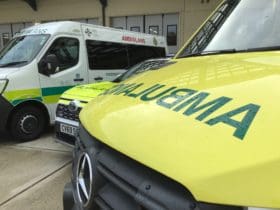Ahead of World First Aid Day on Saturday 8 September the British Red Cross is empowering the nation to learn five simple skills that could save a life. These include how to help someone who is: choking, bleeding heavily, unresponsive and breathing, unresponsive and not breathing and having a seizure.
[aoa id=”1″]

During a life-threatening emergency it is the actions of the first person on the scene that can mean the difference between life and death. Doing something is always better than nothing.
When Joanna Mitchell’s husband suffered the first of two cardiac arrests on New Year’s Day, he became unresponsive and stopped breathing and it was her quick-thinking and first aid knowledge that saved his life.
Joanna, 52, who has been with her husband Graham for almost 20 years, gave him chest compressions for 11 minutes before the ambulance crew arrived. Her actions kept his blood flowing to his vital organs keeping him alive until help arrived.
Graham, 52, had been complaining that he didn’t feel well just moments before he collapsed on the floor.
Joanna, from Herne Bay in Kent, said that everyone should know these vital skills, which could end up saving their loved ones or someone else’s.
Joanna said: “My first thought was to run but then something kicked in because I had learned first aid and I knew what I had to do. I asked my daughter to call an ambulance and sent her outside to wait for it. She left the phone on speaker and the call handler supported me all the way, even when I thought there was no point continuing.
“It was the most terrifying 11 minutes of my life, but if I needed to I would do it again. And not just for my husband, for anyone who needed it. Without this knowledge I would be a widow and my children would have lost their dad. I’ve made sure that all of my daughters know first aid skills.”
Learn the skills
How to help someone who is bleeding heavily
1. Put pressure on the wound with whatever is available to stop or slow down the flow of blood.
2. Call 999 as soon as possible, or get someone else to do it.
3. Keep pressure on the wound until help arrives.
How to help someone who is choking
Someone who is choking may be clutching at their chest or neck and won’t be able to speak, breathe or cough
- Hit them firmly on their back between their shoulder blades. This will help to dislodge the blockage.
- Call 999 if necessary.
How to help someone who is unresponsive and not breathing
If someone is not moving and does not respond when you call them or gently shake their shoulders, they are unresponsive.
1. Check if they are breathing by tilting their head back and looking and feeling for breaths.
2. If they are not breathing, call 999 as soon as possible, or get someone else to do it.
3. Give chest compressions: Push firmly downwards in the middle of their chest and then release.
4. Keep pushing firmly at a regular rate until help arrives.
How to help someone who is unresponsive and breathing
If someone is not moving and does not respond when you call them or gently shake their shoulders, they are unresponsive.
1. Check if they are breathing by tilting their head back and looking and feeling for breaths.
2. If they are breathing, move them onto their side and tilt their head back. This will help keep their airway open.
3. Call 999 as soon as possible.
How to help someone who is having an epileptic seizure
- The person has collapsed and is making sudden jerking movements. They may also have froth around their mouth.
- Make them safe and prevent injury. Use a blanket or clothing to protect their head. Do not restrain them.
- After the seizure, help the person to rest on their side with their head tilted back.
- Call 999 if necessary.
The person needs urgent medical attention if:
- it is their first seizure
- the seizure lasts longer than five minutes
- they have hurt themselves
- you are unsure as to the cause of the seizure.
If you can’t call 999, get someone else to do it.







Leave a Reply
View Comments